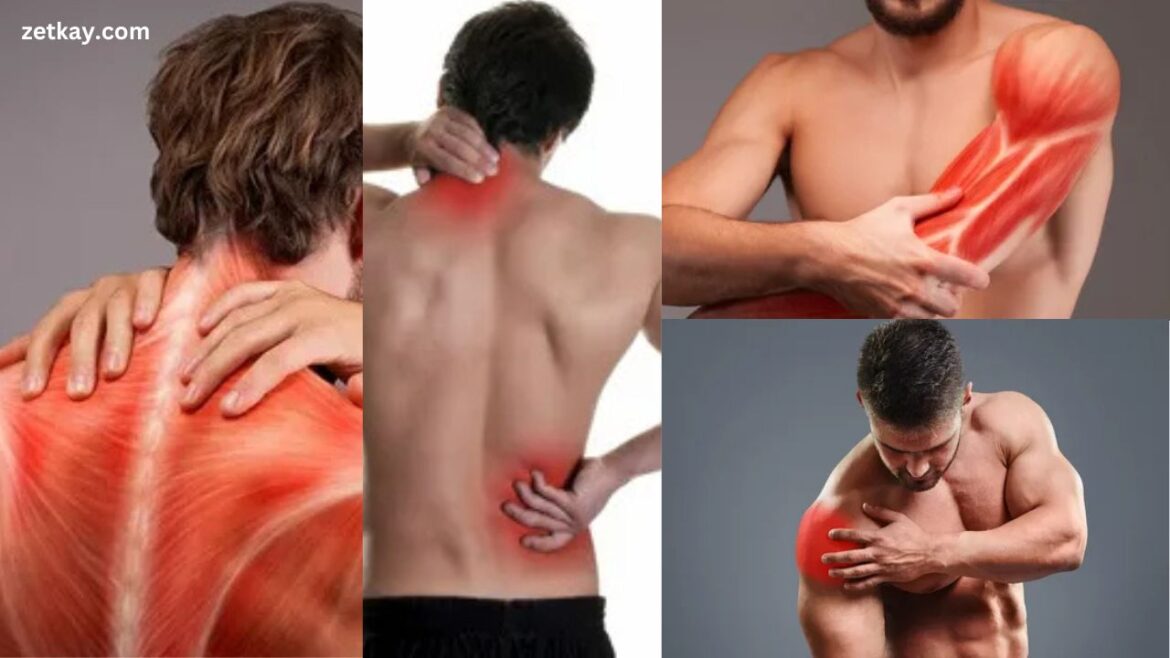Dealing with Muscle Pain can be frustrating, especially when it limits our ability to perform everyday activities or exercises we enjoy. But did you know that certain exercises can actually help reduce muscle pain? In this article, we’ll dive into various causes of muscle pain and explore effective exercises, remedies, and tips for relief.
How Many Causes of Muscle Pain Are There?
Muscle pain, also known as myalgia, can be triggered by various factors, and understanding these causes is crucial for finding relief. Muscle pain can result from physical strain, underlying health issues, or even mental stress. Here are some common reasons people experience muscle pain:
- Physical Overuse: Overworking muscles during physical activity can lead to soreness and stiffness.
- Injury: Strains, sprains, and muscle tears often cause immediate and long-lasting pain.
- Tension and Stress: Mental stress causes muscles to tighten up, leading to tension and discomfort.
- Medical Conditions: Conditions like fibromyalgia, infections, or autoimmune diseases may cause chronic muscle pain.
Let’s now explore specific areas where muscle pain is most commonly felt and discuss targeted strategies for relief.
Muscle Pain in Chest
Chest muscle pain can be alarming, as it’s often confused with heart issues. However, many cases of chest muscles pain stem from:
- Intense Workouts: Push-ups, bench presses, and other exercises strain chest muscles.
- Poor Posture: Slouching can tighten chest muscles over time.
- Muscle Strain or Pull: Sudden movements can strain chest muscles, leading to soreness.

Exercises for Chest Pain Relief:
- Chest Stretches: Stand in a doorway and place each hand on the doorframe, leaning slightly forward. This stretch helps relieve tightness.
- Arm Circles: Gentle arm rotations increase blood flow to the chest, reducing muscle tension.
- Breathing Exercises: Controlled breathing can ease tension in the chest muscles.
Read More:
How To Cure Headache Naturally
Muscle Pain in Back
Back pain is a common issue affecting people of all ages, often resulting from:
- Improper Lifting Techniques: Lifting heavy objects without proper form strains the back muscles.
- Sedentary Lifestyle: Prolonged sitting weakens back muscles, leading to pain.
- Overuse or Injury: Sports, workouts, and falls can lead to back injuries.

Exercises for Back Pain Relief:
- Cat-Cow Stretch: This yoga pose helps stretch and strengthen the lower back.
- Child’s Pose: Gently stretching forward relieves tension in the back muscles.
- Bridge Pose: Strengthening glutes supports the lower back, easing pain.
Muscle Pain in Shoulder
Shoulder pain can limit arm movement, making daily activities difficult. Causes of shoulder pain include:
- Heavy Lifting: Carrying heavy bags or weights strains shoulder muscles.
- Poor Posture: Slouching puts stress on shoulder muscles.
- Injury or Overuse: Repetitive motions can lead to shoulder strain.

Exercises for Shoulder Pain Relief:
- Shoulder Rolls: Rolling shoulders forward and backward relieves tension.
- Cross-Body Arm Stretch: Gently stretching each arm across the chest can reduce pain.
- Wall Angels: This exercise strengthens upper back muscles, improving shoulder stability.
Muscle Pain in Legs
Leg pain can make walking, running, and exercising uncomfortable. Common causes of leg muscles pain include:
- Overworking Muscles: Intense running or leg workouts lead to soreness.
- Injury or Strain: Pulling a muscles while exercising or sudden movements can cause leg pain.
- Poor Circulation: Limited blood flow causes muscle cramps in the legs.

Exercises for Leg Pain Relief:
- Hamstring Stretch: Stretching the back of your legs can ease pain.
- Calf Raises: Strengthening calves helps support leg muscles.
- Leg Swings: This exercise improves blood flow, reducing cramps.
Reasons for Muscle Pain
Several factors contribute to muscle pain, including:
- Exercise: High-intensity workouts can lead to temporary soreness.
- Injury: Strains, sprains, or impacts can cause painful muscle tears.
- Lifestyle: Poor posture, lack of movement, and stress all play a role in muscle tension.
Recognizing the reasons behind muscles pain helps in choosing the right treatment and exercise to reduce discomfort.
Symptoms of Muscle Pain
Muscles pain symptoms vary based on the cause, but commonly include:
- Soreness or Tenderness: Muscles may feel sore to the touch.
- Stiffness: Reduced flexibility and difficulty moving.
- Swelling or Redness: Visible signs of inflammation around the affected area.
- Weakness: Muscles may feel fatigued or weaker than usual.
These symptoms may worsen with movement, and identifying them can help in finding the best exercise routine or remedy for relief.
Exercises for Muscle Pain Relief
Exercise is a natural way to relieve muscles pain by improving circulation, flexibility, and strength. Here are a few exercises that target general muscles pain:
- Stretching: Regular stretching improves muscle elasticity and reduces soreness.
- Low-Impact Cardio: Activities like walking or cycling help increase blood flow to muscles.
- Yoga: Yoga combines gentle movements with stretching, relieving tension in multiple areas.
Engaging in these exercises regularly can help prevent future pain and improve overall muscles health.
Home Remedies for Muscle Pain Relief
Alongside exercise, there are several home remedies that effectively reduce muscles pain:
- Ice or Heat Therapy: Ice reduces swelling, while heat loosens tight muscles.
- Massage: Massaging sore muscles promotes blood flow, aiding recovery.
- Epsom Salt Bath: Soaking in Epsom salts can help relax sore muscles.
These remedies can complement an exercise routine, offering extra comfort and relaxation.
How to Relieve Muscle Pain Without Medicine
For those who prefer to avoid medications, several natural methods can help reduce muscles pain:
- Hydration: Staying hydrated prevents cramps and keeps muscles healthy.
- Sleep: Quality sleep gives muscles time to recover and repair.
- Proper Nutrition: Eating protein-rich foods supports muscle recovery.
These natural solutions encourage muscle healing without the need for medication, making them a great option for long-term relief.
What Are the Causes of Muscle Aches?
Muscle aches, or myalgia, are often caused by:
- Physical Activity: Strenuous workouts or new exercises.
- Infections: Viral infections like the flu may cause body aches.
- Autoimmune Conditions: Conditions like lupus or rheumatoid arthritis can cause chronic pain.
Understanding these causes can help individuals take better care of their muscles and prevent future aches.
What Are the Most Common Causes of Muscle Aches?
The most frequent causes of muscle aches include:
- Exercise: Muscle soreness after intense or new workouts.
- Tension and Stress: Emotional stress can create physical tension in muscles.
- Poor Posture: Sitting or standing improperly strains muscles.
Identifying these common causes allows people to adjust their habits and reduce the risk of aches.
What Types of Medical Conditions Can Cause Muscle Pain?
Certain medical conditions can lead to chronic muscles pain, including:
- Fibromyalgia: This condition causes widespread pain throughout the body.
- Polymyalgia Rheumatica: Common in older adults, this disorder causes muscle stiffness.
- Infections: Some bacterial and viral infections lead to muscle soreness.
If muscles pain persists, it’s important to consult a healthcare provider to rule out these medical conditions.
FAQs
Q1: What exercises should I avoid with muscle pain?
Avoid high-impact or strenuous exercises like heavy lifting or sprinting until the pain subsides.
Q2: How long should I rest sore muscles?
Typically, resting for 48 hours helps muscles recover, though soreness from light exercise may resolve sooner.
Q3: Does stretching prevent muscle pain?
Yes, regular stretching improves flexibility and can prevent future muscle pain.
Q4: Can dehydration cause muscle pain?
Yes, dehydration can lead to cramps and muscle stiffness, so it’s essential to drink enough water.
Q5: Should I see a doctor for muscle pain?
If pain persists for more than a few days or is severe, it’s wise to consult a healthcare provider.
Conclusion
Muscle pain can interfere with our daily lives, but understanding the causes and remedies allows us to manage it effectively. Through a combination of targeted exercises, home remedies, and natural strategies, we can alleviate discomfort and prevent future pain. By incorporating simple habits like stretching, proper hydration, and low-impact exercises, you can maintain healthy, pain-free muscles for a better quality of life.
